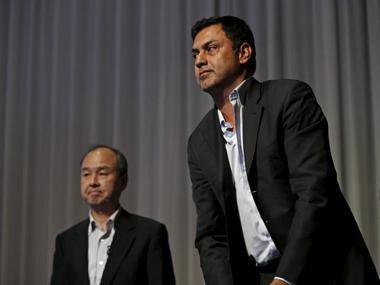The business world is currently hooked on to conversations around Nikesh Arora. Many know who Nikesh Arora is. Many don’t. But many more would now discover him as one of the three highest salaried executives in the world. There are richer people, but they’re entrepreneurs. When someone is paid close to Rs 500 crore per year in annual remuneration, you simply can’t ignore them. [caption id=“attachment_2239554” align=“alignleft” width=“380”]  SoftBank Corp. Chief Executive Masayoshi Son (L) and Nikesh Arora, former President and COO, Softbank. Image: Reuters[/caption] It’s also only natural for them to go on to become inspirational figures for millions of budding entrepreneurs far beyond the Silicon Valley. However, with heroes come another risk. Admirers don’t quite like it when the lives of their heroes take a sudden turn. When things don’t quite go the way they are expecting it to. And the wide world out there has a long list of personalities who have been through journeys of all kinds. Recently, we all read the story of Rahul Yadav, the popular founder of Housing.com. And the series of emails that became public. At some point in time, Rahul Yadav’s unceremonious exit from Housing was likened and compared to the life of the tech world’s accepted hero – Apple co-founder Steve Jobs. The only common factor between them would be a certain element of eccentricity. Nikesh Arora has an impressive resume. But like every important person in the business world, he is known as an ex-Google executive and now as President and COO of Softbank. However, not many would care about the fact that he was on the board of Colgate-Palmolive for two years between 2012 and 2014. He spent a good decade at Google between 2004 and 2014, when resigned as Senior Vice President and Chief Business Officer. Through his career, Arora has held positions such as Chief Marketing Officer at T-Mobile and Fidelity Investments before that. And it helps remind oneself that Softbank isn’t a bank after all. It’s primarily an internet and telecommunications conglomerate with heavy interests in emerging business through its venture fund. So when Nikesh Arora joined Softbank in 2014, it made global headlines. Given that its portfolio of companies includes names such as Buzzfeed, HuffingtonPost, Oyo Rooms, Ola, Didi, Snapdeal, Housing, Yahoo! and Zynga, it makes sense. Anyone leading a company that includes names such as these with billions invested would garner a noticeable level of public and industry curiosity. The last time we saw a similar surge of interest (though not matching in magnitude), was around Arun Sarin when he was at the helm of affairs at Vodafone. The Indian born IIT Kharagpur alumnus, he also has an impressive resume as a telecom executive through most portions of his career. However, as the CEO of Vodafone, he’s known for driving growth in emerging markets, including making inroads into India. Similar to Arora’s tenure at Google, Sarin spent nine years at Vodafone. Coincidentally, Sarin is now on the board of Ola. When the government of India celebrated the Startup India initiative in January this year, Masayoshi Son and Nikesh Arora were among the special guests. We love to see professionals scale up to great heights in their respective careers because we love heroes. Men and women alike. But global businesses are founded and driven by personalities as well. Sometimes, these personalities may not be very public figures. We love the successes of Sundar Pichai, Satya Nadella, Shantanu Narayen, Indra Nooyi. As Indians, they’re inspirational stories. But what about Larry Page, Sergei Brin, Bill Gates, John Warnock, Charles Geschke, and other living founders? There’s a certain difference between creators and executors. Founders and CEOs. Sometimes, CEOs hired later could overshadow founders. Sometimes, it also results in differences and clashes. Remember John Sculley? Steve Wozniak may have been the brain behind Apple, but Steve Jobs was the very visible face. John Sculley, the popular Pepsi executive was hired by Jobs, only to be himself axed from Apple by the board influenced by Sculley. Clearly, the world of business is driven by personalities. And steering the course of the business eventually lies with the passionate leader of the respective business. The one who conceived it, the one who incubated that idea when no one else believed in it. In the case of Softbank, one cannot take away from Masayoshi Son, who at one point in time lost up to $70 billion dollars! He’s regarded as a legend, a visionary. His experience is looked up to. His age commands a level of respect. He identified an able and capable individual to steer it and grow Softbank. But then comes a time when paths differ. And it’s time to set off on a new path. The series of tweets by Nikesh Arora only underscore the admiration and the unspoken rules that the entrepreneurial fraternity abides by. The mutual admiration continues. It’s time for each to pursue their own dreams. New chapters. New destinations. And hope that the twain shall meet.
When the government of India celebrated the Startup India initiative in January this year, Masayoshi Son and Nikesh Arora were among the special guests.
Advertisement
End of Article


)

)
)
)
)
)
)
)
)



